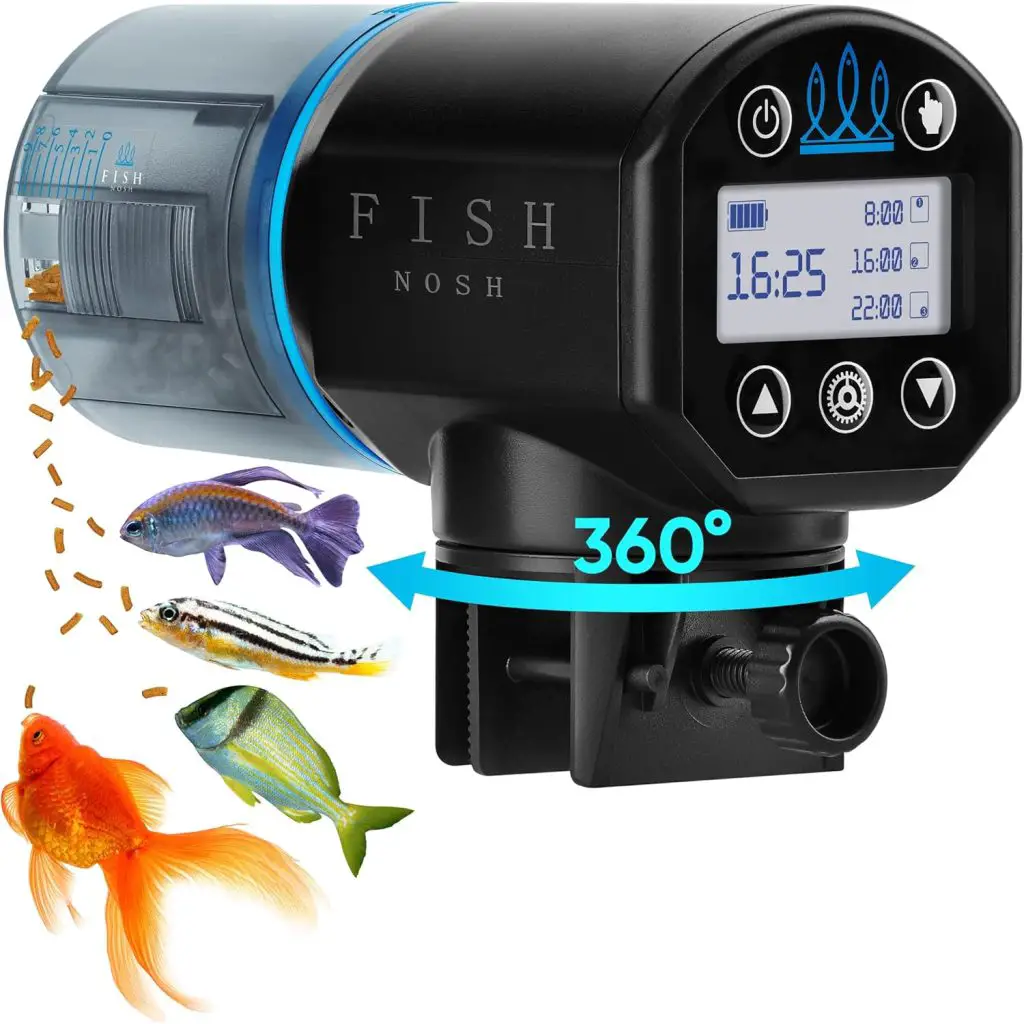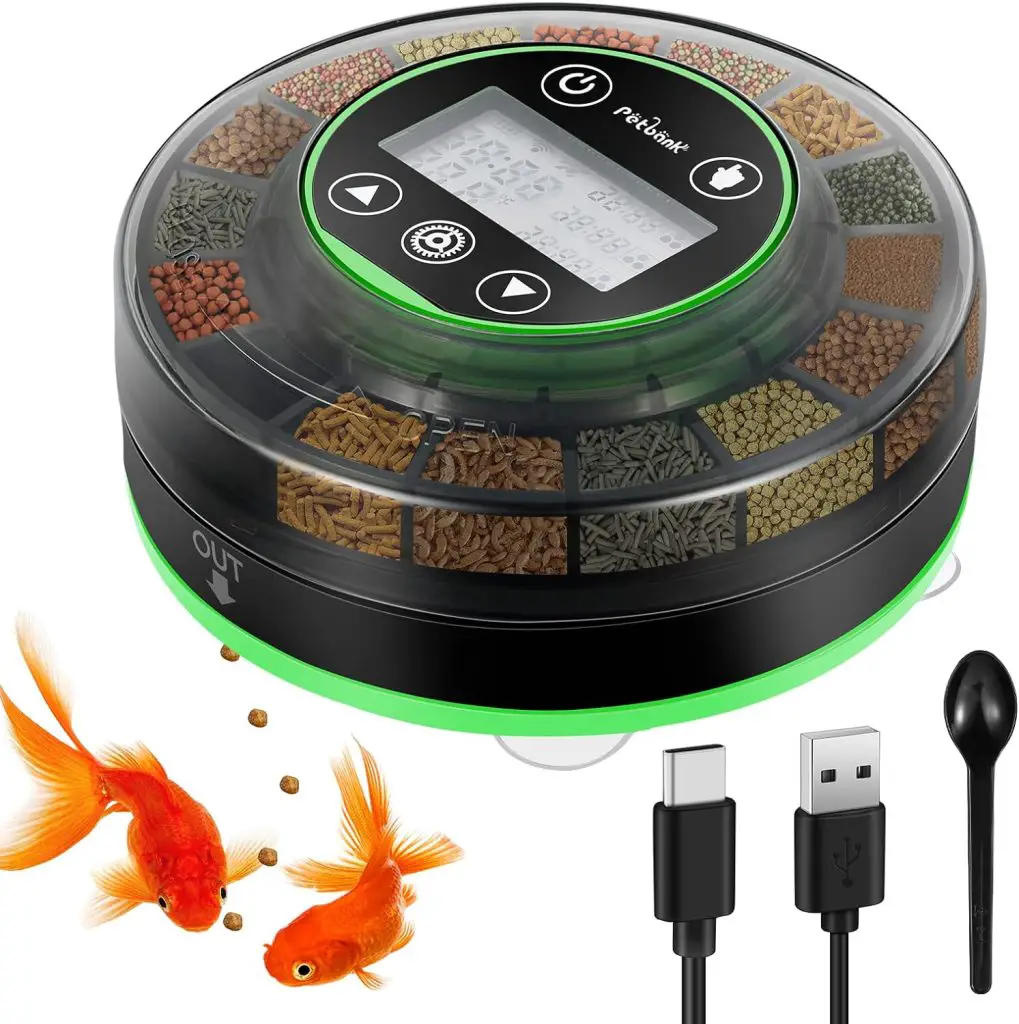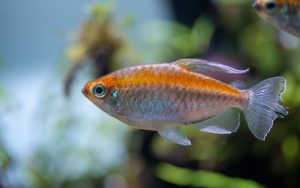How to feed betta fish while on vacation? Going on vacation can be exciting, but for betta fish owners, it can also bring about a sense of worry and concern. How will you ensure that your finned friend is well-fed while you’re away? Feeding betta fish on vacation requires careful consideration and planning to ensure their health and well-being.
This ultimate betta feeding vacation guide will explore the best practices and tips for feeding betta fish while you’re on holiday.
From the importance of proper feeding schedules to the different options available, we will cover everything you need to know to ensure that your betta fish is well-cared for in your absence.

Whether you’re going away for just a few days or longer periods of time, it’s essential to have a plan for feeding your betta fish. Following the advice in this article, you can enjoy your leave with peace of mind, knowing that your beloved pet is taken care of.
Table of Contents
ToggleDo Betta Fish Need To Be Fed Every Day?
Betta fish don’t necessarily need to be fed daily, but they require consistent and appropriate feeding for optimal health. Here’s the breakdown:
Recommended feeding schedule:
- Ideally: Twice a day, with meals at least 6-8 hours apart. You can offer small pinches of food each time.
- Alternatively, Once a day is acceptable, but ensure the portion is appropriately sized.
- Fasting days: Consider skipping a meal once a week, especially if your betta seems overeager or overweight.
Overfeeding is a common concern with bettas, so always err on caution. A good rule of thumb is to offer only what your betta can consume within two minutes.
How long can You go without feeding Your betta fish?
Bettas can survive 5-7 days without food, but it could be better. Their health and immune systems suffer without regular meals. Consider an automatic feeder or a trusted pet sitter for longer absences.
While it’s true that healthy adult betta fish can thrive for up to two weeks without food, it’s crucial to understand that this is not recommended.
After about 5-6 days, their bodies start relying on stored reserves and entering starvation mode, leading to potential health problems like:
- Weakened immune system
- Organ damage
- Lethargy and fin loss
- Increased susceptibility to disease
Therefore, it’s always best to provide regular meals for your betta fish, even during short absences.
5 Best Ways for Feeding Betta Fish on Vacation
Betta fish are independent little guys, but even they need some TLC while you’re on vacation. Here are five ways to ensure your betta fish stays happy and healthy while you’re away:
1. Enlist a fishy friend:
- Ask a trusted friend, family member, or neighbor to check in and feed your betta once a day.
- Provide instructions on feeding amount, type of fish food, and water changes (if needed).
- Offer a small token of appreciation for their help!
2. Automate with an electronic feeder:
- Automatic betta feeding vacation feeder, dispense pre-measured food portions at set intervals.
- Choose a programmable model for customized feeding schedules.
- Test the feeder beforehand to ensure it dispenses appropriately and doesn’t clog.
3. Rely on a vacation feeder block:
- These slow-release blocks gradually dissolve in the water, releasing food over several days.
- Follow the package instructions for the appropriate block size and duration.
- Vacation feeding blocks are best for short trips (less than a week) and healthy adult bettas.
4. Pre-portion and simplify:
- Measure out individual betta food servings for each day of your trip.
- Place them in a labeled pill organizer or small containers.
- Your fish sitter can easily grab and sprinkle the pre-measured food.
5. Skip feeding altogether (for short trips):
- Bettas can go a few days without food if they are healthy and the water quality is good.
- This is only suitable for trips of 2-3 days, and you should perform a small water change before leaving.
Bonus tip: No matter which method you choose, perform a partial water change (25-50%) before you leave to remove any leftover food or waste that could pollute the water while you’re gone. Too much-wasted food dispersal will lead to ammonia and the block running out sooner than advertised.
Remember, the primary key is to choose a method that you’re comfortable with, and that best suits your betta’s needs and the length of your trip. Upon your return, a happy and healthy betta will greet you with vibrant fins and a Fröhlich bubble nest!
Best Vacation Feeder for Betta Fish

The automatic fish feeder is one of the best vacation feeders for betta fish in pet stores. These feeders can be set to dispense a small amount of food at regular intervals, ensuring your betta is fed while you’re away.
Look for a feeder with a reliable timer and adjustable portions to ensure your fish gets the right amount of food. Another excellent option for vacation feeding is a slow-release vacation food block.
These blocks dissolve slowly, providing food for your betta over several days. However, test the block before using it on your betta for an extended period to ensure it doesn’t cause water quality issues.
Whichever option you choose, have someone check on your betta and perform water changes while away to ensure your fish’s well-being.
Choosing the best vacation feeder for your betta fish depends on a few factors, such as:
Length of your trip:
- Short trips (up to 3 days): A simple feeding ring or slow-release food block can be sufficient. These prevent overfeeding and maintain water quality.
- Longer trips (4-7 days): Consider an auto feeder that dispenses small amounts of fish food at set intervals. Look for one specifically designed for betta fish pellets.
- Extended trips (over 7 days): You might need a combination of an automatic feeder and slow-release food blocks for more extended absences.
Your betta’s feeding habits:
- Active eaters: An automatic feeder with multiple feeding times might be necessary.
- Fussy eaters: Try a feeding ring or place food directly in a floating betta log, where it won’t get sucked into the filter.
Budget:
- Simple options: Feeding rings and slow-release food blocks are generally less expensive.
- Automatic feeders: Prices can vary depending on features and programmability.
Here are some popular automatic fish feeders to consider:
Simple and budget-friendly:
- SunGrow Betta Feeding Ring: Prevents food from scattering and keeps the water clean.
- Penn Plax Betta World 7 Day Vacation Betta Feeder: Slow-release food blocks provide high quality nutrition for a week.
Automatic feeders:
- Zoo Med Bettamatic Automatic Daily Betta Feeder: Easy to use and program, dispenses food once daily.
- Eheim Everyday Fish Feeder Automatic: This is a more advanced option with multiple feeding times and adjustable portions.
Additional tips:
- Test the feeder before leaving: Ensure it dispenses food properly and does not overfeed.
- Clean the feeder regularly: Avoid mold and bacteria buildup.
- Leave clear instructions for anyone checking your fish: Include the feeding schedule and emergency contact information.
- Consider having someone check on your betta periodically: Even with a feeder, it’s good to have someone ensure your fish is healthy and the water quality is good.
No matter which option you choose, remember to research and test it beforehand to ensure your betta’s well-being while you’re away.
Tips For Leaving Your Betta Fish While On Vacation
Leaving your betta fish while on vacation can be a source of fret for many pet fish owners, but with some preparation, you can ensure that your fish will be well taken care of in your absence. Before you leave, clean the tank and perform a water change to ensure a healthy environment for your betta.
Additionally, consider investing in an automatic fish feeder to ensure your betta still gets the proper food while you’re away. Having a friend or family member stop by every couple of days to check in on your betta, feed them, and ensure everything is running smoothly is also a good idea.
If you don’t have anyone to check in on your betta, it may be worth looking into a pet sitter or professional fish caretaker. Lastly, consider investing in a timer for the tank’s light to ensure that your betta still gets the proper light daily.
With these essential tips in mind, you can rest assured that your betta fish will be well taken care of while you enjoy your vacation.
Betta Fish Care While Going on Vacation
Bettas are relatively low-maintenance fish, and there are a few things you can do to ensure their well-being while you’re away.
Here are some expert tips to keep your betta fish healthy while you’re on vacation:
- Water changes: Perform a 50% water change before you leave and another one when you return. This will help remove any toxins that have built up in the water.
- Feeding: You can skip feeding your betta for up to 7 days. They can go a little longer without food, but I wouldn’t recommend it for over a week. If you will be gone for longer than that, you can use an automatic fish feeder or ask a friend or family member to feed your fish for you.
- Temperature: Bettas like their water to be between 78°F and 82°F. If you will be gone during a hot or cold spell, you may want to invest in a tank heater or chiller to keep the water temperature stable.
- Light: Bettas need 12-14 hours of light per day. If you’ll be gone for a longer period, you can set your tank light on a timer.
- Decoration: If you plan to be gone for more than a week, you may want to remove any live plants from your betta tank. Live plants can die and decompose while you’re gone, which can foul the water.
- Vacation sitter: If you’re worried about your betta, you can always ask a friend or close family member to check on them while you’re gone. They can feed the fish, do a small water change, and make sure everything is OK.
Following these tips ensures that your betta fish will be happy and healthy while on vacation. So relax, have fun, and enjoy your tour!
Here are some additional things to keep in mind:
- If you’re using an automatic betta fish feeder, test it before you leave to ensure it works correctly.
- If you’re asking a friend or family member to care for your fish, be sure to leave your fish with clear instructions on how to feed them and do water changes.
- If you’re concerned about your betta’s health, you can always take them to a pet sitter or boarding facility.
Commonly Asked Questions about Ways To Feed Your Betta fish while on vacation (FAQs)
Can you leave fish alone for a week?
Leaving fish alone for a week depends on the species! Most freshwater fish tolerate 5-7 days but check yours specifically. Ensure suitable water parameters & consider automatic feeders or a friendly fish watcher for longer trips.
What to do when leaving betta fish for a week?
When leaving your betta fish for a week, use a reliable automatic betta fish vacation feeder, ensure the fish tank is clean, and set up a timer for the aquarium light. Perform a water change before leaving.
What happens if you forget to feed your betta fish?
Forgetting to feed your betta fish can lead to starvation, weakened immune system, and even death. It’s crucial to plan a regular feeding schedule to ensure their well-being.
Is it OK not to feed betta once a day?
It is generally not recommended to skip feeding your betta fish for a day. They require regular meals to maintain their health, and skipping meals can lead to nutritional deficiencies.
How long can I leave my fish alone?
It depends! Freshwater fish are usually OK for 5-7 days with a clean tank and dim lights. Check your species and consider feeders or a fish sitter for longer trips.
Will betta fish stop eating when they are full?
Betta fish rarely refuse food, even when full. Overfeeding is common. Stick to 2-3 pellets twice daily, about the size of their eye, to avoid digestive issues.
Can betta fish eat vacation tablets?
Bettas can eat vacation tablets, but experts advise against them. They often overfeed, cloud water, and need more complete nutrition. Consider automatic vacation fish feeders or a fish sitter for longer trips.
How can I feed my betta fish while on vacation?
For betta fish feeding on vacation, consider options like automatic feeders, slow-release food blocks, or asking a trusted friend or neighbor to check-in. Test any feeders beforehand and ensure clear instructions!
Conclusion
In short, when it comes to vacation planning, we often overlook the needs of our beloved betta fish. However, with some preparation and thoughtfulness, we can ensure that our finned friends are well-fed and cared for while we’re away. Investing in an automatic feeder can provide a reliable and consistent food source, mimicking our regular feeding routine. Additionally, reaching out to a close friend or neighbor who can stop by and feed our bettas can offer peace of mind.
Communicating specific instructions and providing them with the necessary information is crucial to ensure proper care. Remember, a well-fed betta is a happy betta, and by considering their feeding requirements in advance, we can enjoy our vacations worry-free. So, next time you plan a getaway, remember to include a plan for feeding betta fish on vacation.
You might also like
- Betta Fish Spits Out Food: 5 Common Causes & Quick Solution
- Overfeed Betta Fish 101: Recognizing Symptoms and Quick Fix
- Maintaining The Ideal Ph for Betta Fish Aquarium (Solved!)
- The Ultimate Betta Fish Vacation Feeder Guide: 5 Winning Tips
- How Often Do You Feed a Betta Fish? & How Much! (Solved)
- My Betta Fish Won t Eat and Barely Moves: Solved & Explained
- How Often Should You Clean a Betta Tank: (Essential Guide!)




